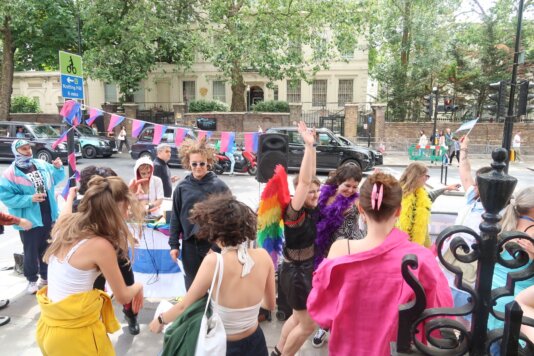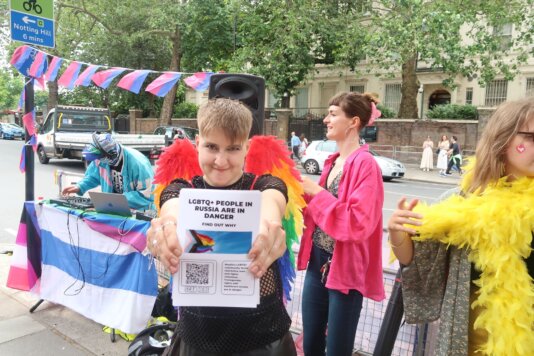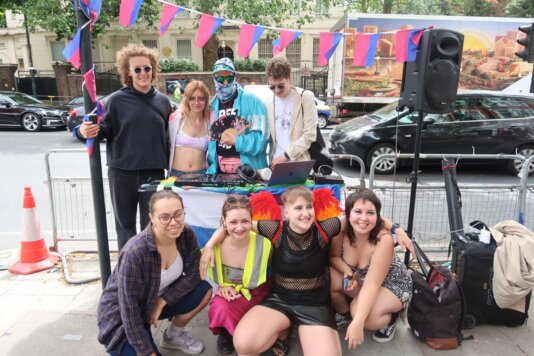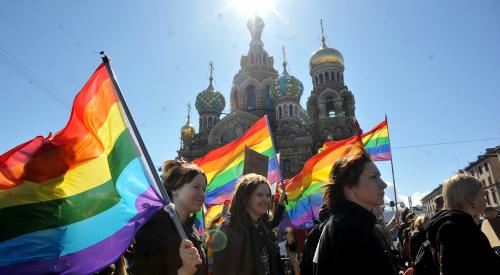- About
- Topics
- Picks
- Audio
- Story
- In-Depth
- Opinion
- News
- Donate
- Signup for our newsletterOur Editors' Best Picks.Send
Read, Debate: Engage.
| August 03, 2023 | |
|---|---|
| topic: | LGBT Rights |
| tags: | #Russia, #LGBTQ+, #Ukraine war, #trans rights, #protest |
| located: | Russia, Ukraine, United Kingdom |
| by: | Eleftheria Kousta |
As London was beaming with glitter and colour during pride celebrations in the first weekend of June, a group of young Russians and their allies had gathered outside the Russian embassy in London. Recognising that many of their compatriots back home are not able to do partake in pride, the group decided to throw a queer protest rave outside the embassy.
Their goal was to show that despite government crackdowns, queer people will continue to fight for their rights and have a good time while doing that, according to Masha Budryte, coordinator of the UK-based anti-war and anti-Putin group Russian Democratic Society (RDS).
"We are queer people and we like to have fun even in the darkest of times," Budryte told FairPlanet. "We decided to spread awareness by just having a good time and showing them that they are not going to win."
Making clear that pride is still a protest, the group chose colourful placards and DJ decks to challenge Putin's regime. One of the protesters present, Dmitri Moskovskii, told FairPlanet that as an openly gay person in the relative safety of London, he had to raise his voice, claiming it is important for those now living in exile to stand up for their queer siblings living in unsafe countries.
As pride celebrations migrated from the streets to London’s nightlife venues, the protesters continued to fight for their cause on London’s dancefloors. In collaboration with Fetchish, a rave collective in support of Ukraine, Anna-Maria Tesfaye, a Russian-Ethiopian queer activist and co-founder of Queer Svit, a group that helps queer people POCs in Russia, Ukraine and post-Soviet countries, organised a fundraising party.
According to Tesfaye, organising events that provide both enjoyment and the opportunity to donate to a worthy cause serves as a solution to the discomfort that often accompanies discussions about the violation of LGBTQ+ rights.
"Everything we do to raise awareness is not to make others feel sad or pity for the people we help, but to celebrate their bravery," said Tesfaye.
The timing of the protest was particularly significant, as many of the demonstrators were preparing for the impact of a recently passed legislation in the Russian Duma. On 14 July, the Duma unanimously approved a bill that bans gender-affirming healthcare, which Budryte and Tesfaye indicated was relatively easier to access even compared to places like the UK.
The recently passed bill has further tightened restrictions on the individual freedoms of queer people in Russia. Its provisions included the prohibition of changing gender markers on official documents, a ban on adoption for transgender individuals and the annulment of marriages for trans people. The law can be seen as a follow-up to previous legislation enacted in 2022, which introduced a complete ban on LGBTQ+ "propaganda," building upon earlier laws that were established in 2013.
"In Russia, homophobia is fully endorsed by the state. It is impossible to speak positively about LGBTQ+ people in any form," Moskovskii said. "Often, our only option is immigration, as not everyone can live in a perpetual state of socially imposed self-hatred."
According to Butryde, the situation for queer people in Russia is further complicated by the lack of support from within the country. Many activists and allies have faced persecution, forced to leave or remain silent due to the oppressive environment.
Russia's invastion of Ukraine, she added, has also had a significant and acute impact on queer individuals, compounding the difficulties they already face.
LGBTQ+ people from Russia and post-Soviet countries have been at the forefront of anti-war action. According to OVD-Info, a Russian organisation monitoring the situation of political prisoners, this year there have been more than 40 cases opened against LGBTQ+ members based on anti-queer laws. Only 16 cases were opened last year.
Several cases involving queer individuals were also attributed to the defendants' anti-war positions, highlighting the intersection of LGBTQ+ rights and political activism in a volatile environment. One such case is that of Alice Femina, who found herself subjected to a strip-search and imprisonment based on allegations of shouting a 'pro-Ukrainian' slogan.
Recognising the harsh reality faced by transgender individuals in the wake of the anti-trans bill, Tesfaye emphasized that her group is actively working to provide assistance and support. "We formed during a crisis and we operate on that basis, responding to what is currently happening," she said, noting that requests for help by trans people from Russia have increased.
Tesfaye further explained that often it is not safe for people to seek help elsewhere. "There are 200,000 people of African descent in Russia, a lot of non-Slavic people, queer people, facing severe discrimination, even when they go to ask for help."
Queer Svit provides them with information, relocation assistance and emergency accommodation, among other types of support.
The struggle of LGBTQ+ people in Russia is linked to the wider context of the war in Ukraine. "We’ve seen this in every war. The state tries to crush dissent and raise the spirits of their supporters by targeting the most vulnerable groups. Queer people in Russia are one of those," said Budryte.
In her view, this ties to the regime’s imperative to "decide how other people live their lives and how they express their identity," whether they are a queer person in Moscow or a Russian-speaking Ukrainian in Donbass.
Moskovskii also said that as a result of this persecution, many queer individuals have turned to alternative channels of information to stay informed and connected. This has allowed them to be among the first groups to witness and recognize the events unfolding in Ukraine, drawing parallels with the repressive actions of the Kremlin. "You soon realise that people in Ukraine are being monstrously murdered by the government while fighting for their right to exist on a daily basis. This is the same regime that suppresses us, LGBTQ people at home, for just existing."
The protesters also acknowledged Russia's role in perpetuating anti-LGBTQ+ attitudes in several countries that were formerly part of the USSR. They recognised that homophobic legislation introduced in Eastern Europe and Central Asia can be attributed to Russian imperialism. Budryte emphasised that while there are similarities in the struggles faced by LGBTQ+ communities across these regions, there are also distinct differences. The influence of Russian policies and cultural norms has contributed to the entrenchment of anti-LGBTQ+ sentiments in these countries, but each region has its own unique socio-cultural and political dynamics that shape the nature of the LGBTQ+ struggle.
"United Queerdom works a lot with these communities and talks on anti-imperialism, some of them supporting us today, and it is nice to know that the people attending are not just from Russia and St Petersburg."
Moskovskii added that "people from all kinds of violently homophobic countries have similar experiences of harassment, and often need to share their pain and trauma with others."
Tesfaye, while recognising that people from across Eastern Europe and Central Asia are increasingly joining forces in their struggles, believe there is still a long way to go. "I try to talk to a lot of post-Soviet groups, but even talking to them about collaboration is a job on its own because of the need to explain why queer people and POC need specific help."
Queer Svit, she stressed, remains an open door for anyone who is LGBTQ+ or POC from any post-Soviet country.
Despite the challenging circumstances faced by LGBTQ+ individuals in Russia and Eastern Europe, activists continue to call on those residing in safer countries to lend their support.
"No one is free until all of us are free. If you have your rights protected, don’t stop and stand up for those who are like you but not as lucky to be living in places like London, where we see all these fabulous displays of pride and nobody would beat you up or arrest you for wearing a pride flag," said Budryte while giving flyers to passersby.
"We hope people going to pride will talk about it and share this information," Budryte added. "It is important to know what is happening and keep talking about LGBTQ+ people who are stuck and might end up in prison, in Russia and anywhere where LGBTQ+ rights are threatened."
Tesfaye reiterated that it is paramount to give a platform to queer and POC individuals on which to raise their voices and facilitate this space whenever given the opportunity. Tesfaye emphasised that she often hears people from post-Soviet countries saying that protesting doesn’t work and won’t change anything - a sentiment she disagrees with. According to her, while protesting for human rights under repressive regimes might not yield significant results, doing so in more liberal environments could urge governments to take action.
"This is the message I got from many of my Ukrainian friends," she said. "I think the protest and rage of the people in the beginning of the war was something that impacted policies a lot, and it started from little things. Every small action helps, even if it’s just a chat in the kitchen."
Editor's note [11 August, 2023]: United Queerdom's primary mission is to assist in the integration of LGBTQ+ immigrants from Central Asia and Eastern Europe into the UK.
Image by Eleftheria Kousta.
By copying the embed code below, you agree to adhere to our republishing guidelines.




